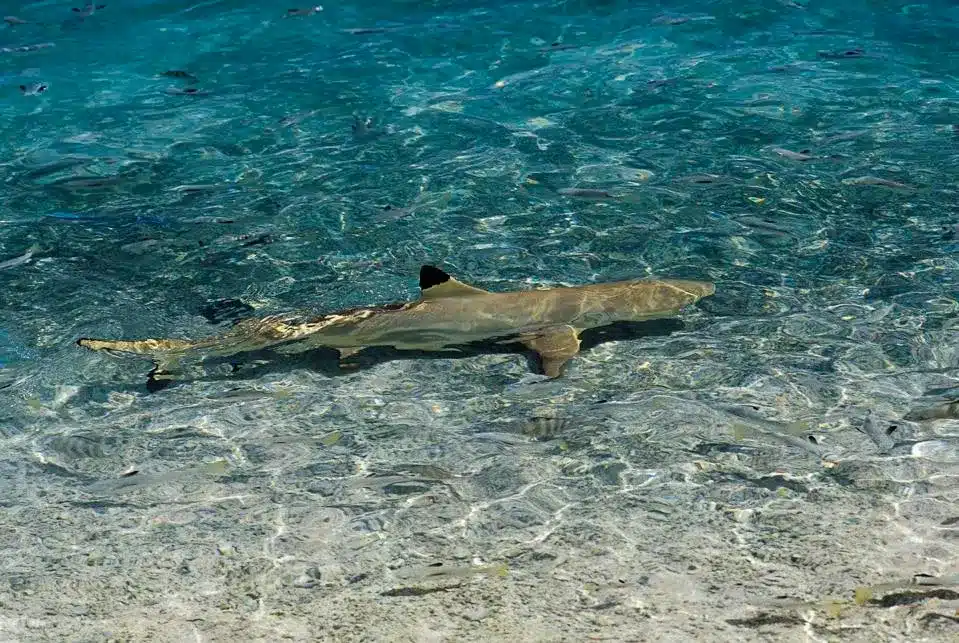Health Risks for Blacktip Reef Sharks in French Polynesia

Blacktip reef sharks, a common sight in the waters of French Polynesia, are facing serious health challenges. These challenges stem from the frequent feeding of low-quality food scraps by tourists. Reports indicate that these sharks are being fed everything from frozen squid to human leftovers. This practice has led to significant changes in their metabolism, movement, and reproductive patterns. As a result, there are growing concerns about the long-term consequences for this species, which is classified as “vulnerable” by the International Union for Conservation of Nature. Understanding the impact of these feeding practices is crucial for the conservation of blacktip reef sharks and the overall health of marine ecosystems.
Shark Feeding Practices Impact Metabolism
Recent research highlights the adverse effects of tourist-driven feeding on blacktip reef sharks. A study published in *Animal Conservation* by marine behavioral ecologist Johann Mourier and his team at the University of Montpellier examined the metabolic and reproductive changes in these sharks over three years. The researchers analyzed blood samples from 117 blacktip reef sharks across 17 different sites. Five of these sites were known for frequent tourist feeding.
The findings were concerning. Sharks at feeding sites showed lower levels of red blood cells, which is a key indicator of overall health. Additionally, the blood glucose levels in female sharks were significantly lower compared to those in non-feeding areas. This suggests that the food scraps provided by tourists lack the necessary nutritional value that these sharks would typically obtain from their natural diet. The study underscores the importance of a balanced diet for the health of these marine predators. Without it, the sharks may face metabolic issues that could affect their survival in the wild.
Reproductive Changes Observed in Feeding Site Sharks
The study also revealed significant changes in the reproductive hormone levels of blacktip reef sharks. Males at feeding sites exhibited increased testosterone levels. This rise in testosterone may be attributed to heightened competition for the limited food resources provided by tourists. In contrast, female sharks at non-feeding sites were consistently pregnant and showed triple the estrogen levels compared to those at feeding locations. This discrepancy raises concerns about the reproductive success of sharks that rely on human-provided food.
The unpredictable and nutritionally inadequate diet at feeding sites could be impacting the reproductive health of these sharks. Scientists suggest that this may lead to lower birth rates and ultimately affect population sustainability. The long-term consequences of these changes could be dire, as a decline in reproductive success can threaten the viability of the species. It is essential to address these issues to ensure the future of blacktip reef sharks in French Polynesia.
Calls for Better Regulation of Shark Feeding
Experts are increasingly calling for better regulation of shark feeding practices in French Polynesia. In an interview with *Science News*, biologist Natascha Wosnick from the Cape Eleuthera Institute emphasized that unregulated shark feeding can alter natural behaviors and compromise the welfare of these animals. The concerns are not limited to blacktip reef sharks; other species, such as nurse sharks in the Bahamas, may also face similar risks due to increased energy expenditure linked to human-provided food.
To mitigate the negative impacts on shark health and reproduction, experts recommend implementing regulations on the types of food offered to sharks, especially during breeding seasons. These regulations could help ensure that sharks receive a more balanced diet that supports their health and reproductive success. By taking action now, we can protect these vulnerable species and preserve the delicate balance of marine ecosystems in which they thrive.
Observer Voice is the one stop site for National, International news, Sports, Editor’s Choice, Art/culture contents, Quotes and much more. We also cover historical contents. Historical contents includes World History, Indian History, and what happened today. The website also covers Entertainment across the India and World.

